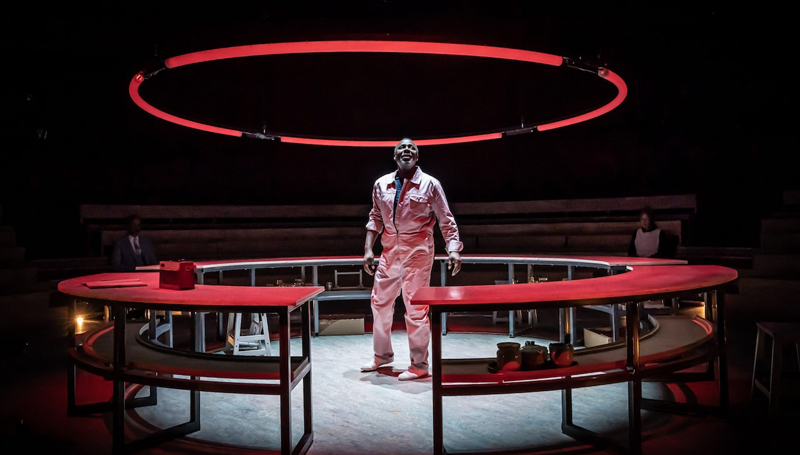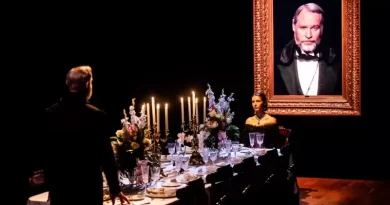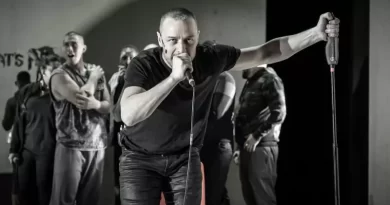“Further Than the Furthest Thing”, Young Vic
Simon Jenner in south London
19 March 2023
Slow-burn seems an inevitable phrase for Zinnie Harris’s second (1999) play Further Than the Furthest Thing, now revived at the Young Vic by Jennifer Tang. Especially given a lethargic volcano threatens half-way through the show. Other forces though are even less dormant. Themes of an island’s isolation, fragility, and singular life are given lungs here. It’s certainly a production that breathes at its own pace but is – emphatically – worthwhile.
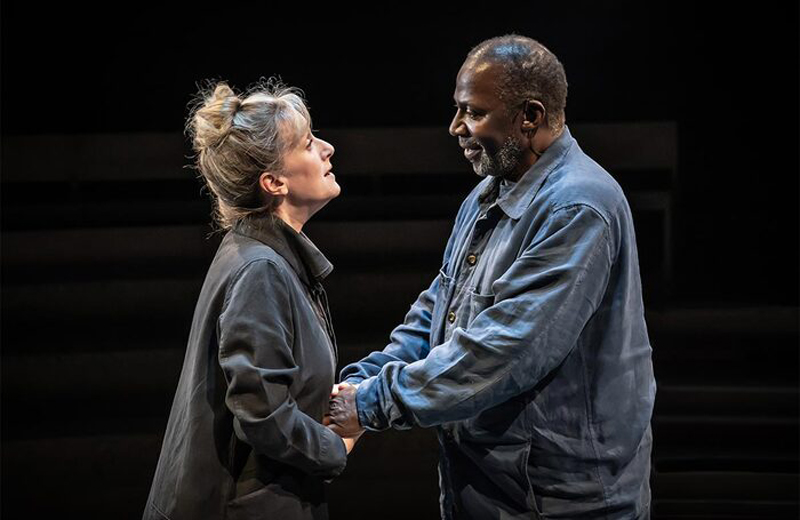
Jenna Russell and Cyril Nri.
Photo credit: Marc Brenner.
Tang brings out the play’s mesmeric qualities – the singular dialect, the pace – with a host of effects: not least in adding live vocalist Shapla Salique. Her few appearances singing Ruth Chan’s music underscore loss and deracination, in an achingly memorable vocalese. A wordless elegy is consonant with Harris refusing to overstate how a unique world’s threatened by an all-too-common one.
Harris based her drama on real events: in 1961 the British inhabitants of far-flung South Atlantic island Tristan da Cunha, poised between South Africa and South America, were relocated in the face of danger. But it became a pretext.
There are parallels with the very different Outlying Islands. But David Greig’s 2002 play is both more focused and more spooky. Tang though infuses this production with a mythic dimension of her own, visually and sonically stunning, which nevertheless further exposes the first act’s longeurs, in stretching out silences between characters. It’s punctuated with George Dennis’s sound design: the bass-swell of a world undermined; above all Prema Mehta’s wondrous lighting between silences. I’ve seldom seen even the Young Vic dazzle like this.
Soutra Gilmour’s circular set sweeps to an amphitheatre of sparse action, with a few props, relying on Mehta’s lighting which renders this space both epic and sharpy delineated. Ian William Galloway’s video work strikes through this at key moments. The second half features circular interlocking tables doing undistracting service as boardroom and boiler room in an English factory.
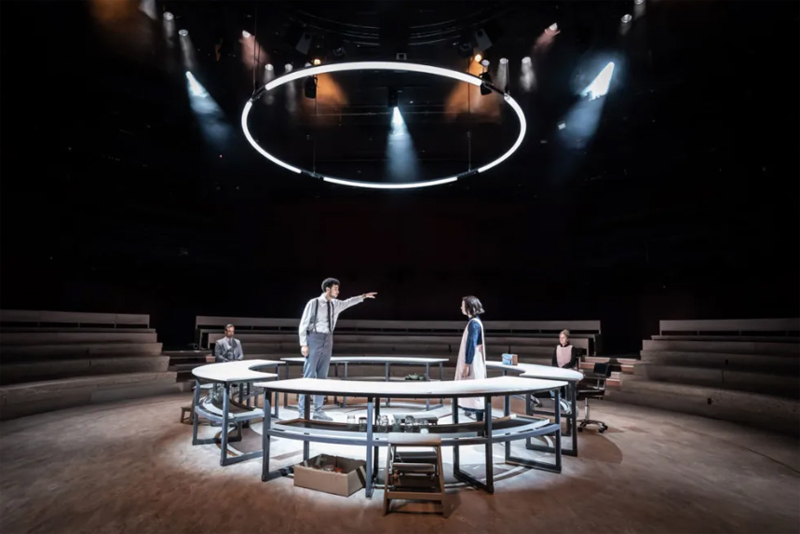
The ensemble.
Photo credit: Marc Brenner.
Francis (Archie Madekwe) has returned to the island from work in South Africa, encountering his mother’s sister Mill (Jenna Russell) and husband Bill (Cyril Nri) who brought him up. They’ve just managed to fail a three-egg trick (you’ll need to see this) with “pinnawin H’eggs”. The preciousness of even an egg is a theme that returns with devastating force towards the end. Russell’s and Nri’s use of dialect recalls Orcadian: coach Victoria Woodward finds a winning analogue to a vanished idiom.
Their use of dialect is the richest of the four islanders, full of litanic repeats – I’ve seldom known so many in a single play – which Tang draws out further with pauses. Russell in particular, given several monologues, teases out a world of pitiless beauty, coupled with a hypnotically slow presence, as Ingrid Mackinnon’s movement direction gives each character a different gait – mostly slow. Nri manages this even more, though he has less dialogue. Tang allows Nri to build Harris’s text for Bill to become an imposing – ultimately torn – conscience.
Madekwe’s movement directly contrasts. He doesn’t own the stage but nibbles round the edges in nervous shuffles of an exile unsure of his welcome. Later, more assured, he holds back for conflicting reasons. Madekwe neatly encapsulates the youth charmed by the discovery of wages, capital, and opportunity: the island doesn’t use coins. But he’s brought them back with him.
It’s where characters develop more unexpectedly. Mr Hansen (Gerald Kyd) with his winning magic tricks (in John Bulleid’s illusion direction) ends indeed in silver coins. Svelte and beady, Kyd starts with a promise of mission creep. A South African jar manufacturer, Hansen’s intent on harvesting the island’s crayfish. He literally wants to can the island, or vacuum-pack it in a bell-jar. Events overtake both him and a curious (not quite explained) volte-face from Francis.
So after witnessing a desperate event involving Francis’s former lover Rebecca (Kirsty Rider) Hansen is drawn in too. Instead of tightening his grip on power he declares the islanders “get under my skin”, wrestles with empathy, and ends up making confession and turning confessor himself. Kyd’s own stillness seems initially hawk-like. By the end it’s almost hopelessly paternal, penitent, ashamed.
The second half, slightly shorter, is a lot pacier. Transplanted, the islanders wish to return, prompting Hansen’s compact with Bill, momentous enough, but nothing like Mill’s to Hansen, the icy crux of the island’s story and Russell’s great moment. Nri and Russell unpack more tragedy, leaving the young as the only underwritten characters. Rider’s sing-song dialect hauntingly conveys Rebecca’s self-knowledge, self-accusation, and hurt. Rider does her best with this more marginal part, sometimes bleaching her language from anything that might admit passion.
With all these pauses you feel there could have been more. And there’s certainly enough for Rebecca in a harrowing scene to prompt some final catharsis. So Rebecca’s dialogue with Francis – who speaks more but whose character is still underwritten and partly unknowable – doesn’t mean what it could. Francis lacks awareness, Rebecca retreats into a flinch from tenderness. But this doesn’t lack truth.
Harris’s play though at its best treats themes with a superb obliquity, and will stay with you for that reason and the hypnotic language and characterization of at least three protagonists. In her work, capitalists turn out as much pawns in the hands of bigger forces as the islanders themselves. Understated incursions by “the British navy” and other interests emphasize that the lives of even such isolated people can’t escape large events; both in wartime and in that interesting post-war moment, where an island itself turns as fragile as a pinnawin egg.

